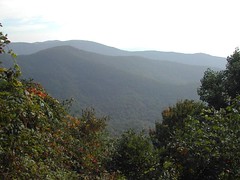As journalists focus on bridge safety, some other resources have been added: Resourceshelf has posted
a new collection of links here; over at the Internet Marketing Blog from e-strategy.com, David Erikson, a St. Paul resident, has compiled lots of links on how the coverage of the collapse evolved on the Web:
Minneapolis Bridge Collapse and Citizen Journalism.
At News Designer, a
collection of front pages on the collapse.
(
Added later:) Oh, and over at Journerdism, Will Sullivan has a useful post for all local news sites that might someday have to deal with the big story on their turf:
Are you and your news site ready for your local Armageddon?It seems America's lust for bottled water is increasingly coming under attack, with good reason. A couple weeks ago I was stunned by this report, from FastCompany.com, about bottled water:
Message in a Bottle. It's a shocker:
Thirty years ago, bottled water barely existed as a business in the United States. Last year, we spent more on Poland Spring, Fiji Water, Evian, Aquafina, and Dasani than we spent on iPods or movie tickets--$15 billion. It will be $16 billion this year.
...Meanwhile, one out of six people in the world has no dependable, safe drinking water. The global economy has contrived to deny the most fundamental element of life to 1 billion people, while delivering to us an array of water "varieties" from around the globe, not one of which we actually need.
I was particularly appalled by the story of Fiji Water (do you drink it?):
...a state-of-the-art factory spins out more than a million bottles a day of the hippest bottled water on the U.S. market today, while more than half the people in Fiji do not have safe, reliable drinking water.
... since the plastic for the bottles is shipped to Fiji first, the bottles' journey is even longer. Half the wholesale cost of Fiji Water is transportation--which is to say, it costs as much to ship Fiji Water across the oceans and truck it to warehouses in the United States than it does to extract the water and bottle it.
Read the whole thing. It's mindboggling.
On MSNBC, this report from Arthur Kaplan:
Pour the bottled-water trend down the drain. Asks Kaplan:
If you want to head out on hypocrisy patrol among the environmentally concerned, don’t worry about what they are eating or whether they fly, drive or walk from place to place. Just ask them, “What are you drinking?”
In today's LA Times, another column from Tom Standage:
As a health drink, bottled water is all wet:
Bottled water would appear to be the ultimate triumph of marketing. If you can get people to pay so much for something that is already available at very low cost in their own homes, doesn't that suggest that they will buy anything? Canned air, anyone? Of course, in a free society, people should be able to spend their money on silly things, provided they are in full possession of the facts. But many people are not, judging by the persistence of the idea that there is something magically superior about bottled water.
Here's
the NRDC's report on the safety of bottled water, "Pure Drink or Pure Hype", from a few years back.
Speaking of the environment, Doc Searls, who's
moved his blog to a new site at Harvard, where he's spending the next year or so, wrote a lovely piece this week on living without air conditioning. This is definitely worth the read. He calls it
Back to Natures:
So I’m thinking that now, in the middle of a summer night on a Baltimore porch, soaked in sweat, that I’m getting my edge back. If you’re not actually burning or freezing, heat and cold are just sensations. You can call them discomfort if you like, but they’re a small price to pay for experiencing nature’s cyclic perfections.
Well, I turned on the air conditioning this week, just for the next few days as the humidity and heat rise above normal. Before this week, the AC was on just one afternoon. And, the water bottles I carry in the car (I need to make sure I drink enough) are used store bottles or a reusable container, filled with well water from my tap. It's a start.
Seems the latest Congress-approved move to allow more spying on Americans by our government (do you really believe this will target only foreigners?) is being pretty much ignored by the media, although
a few bloggers have been alert.
A good source for finding out more, it seems, is Wired's
Threat Level blog, which is becoming a must read. A recent post analyses the bill, and claims that among other things:
...the Protect America Act, removes the prohibition on warrantless spying on Americans abroad and gives the government wide powers to order communication service providers such as cell phone companies and ISPs to make their networks available to government eavesdroppers.(Added later:)
Dan Gillmor looks at the only story in the New York Times on this topic, by James Risen (which I couldn't pull up yesterday), and asks:
...why didn’t they tell us about this before the law was passed?
Labels: environment, journalism





